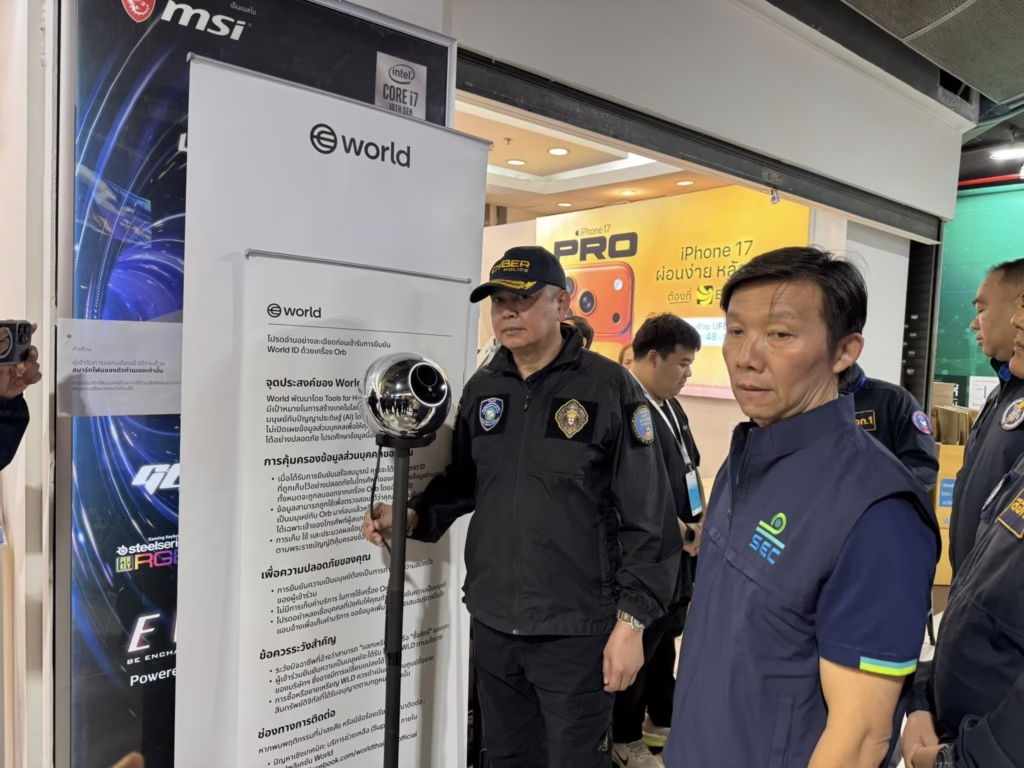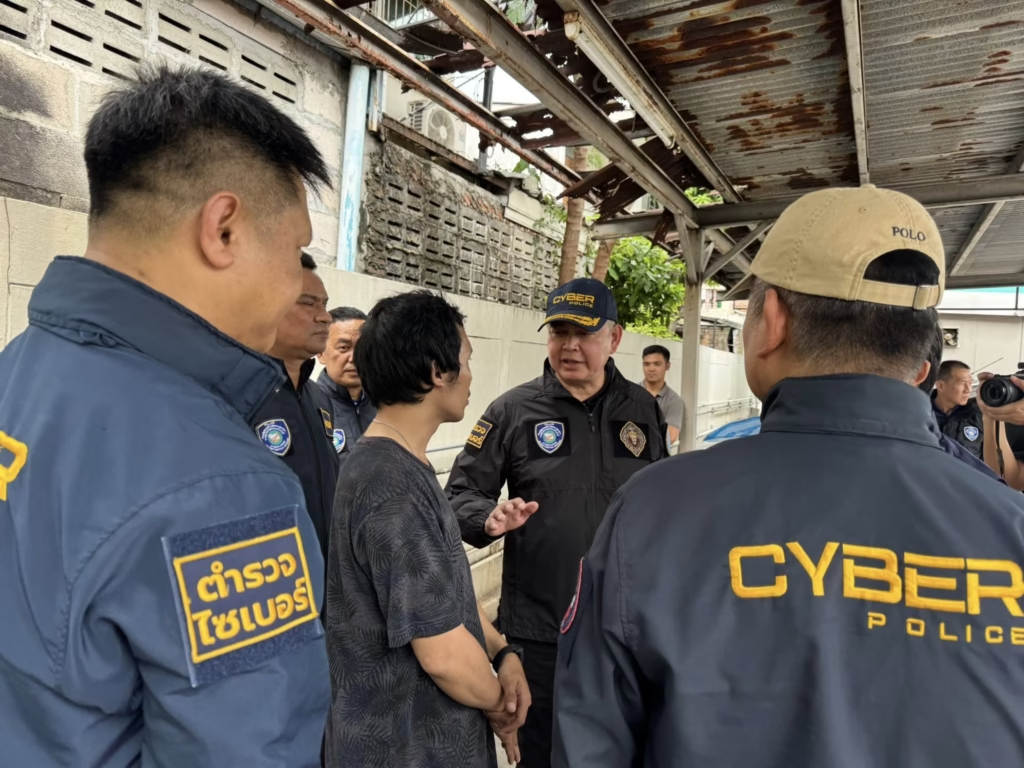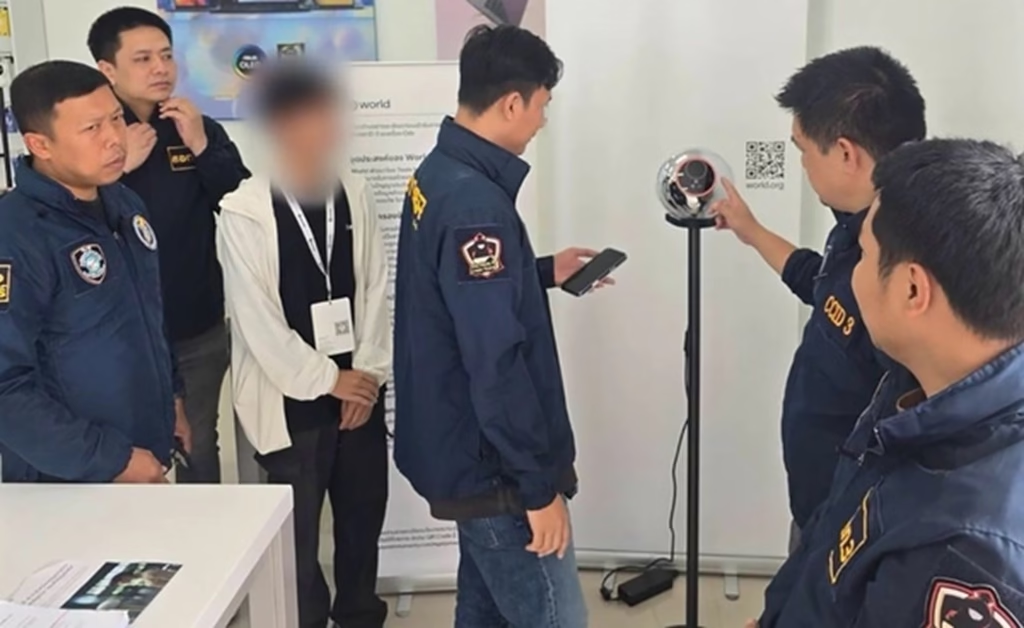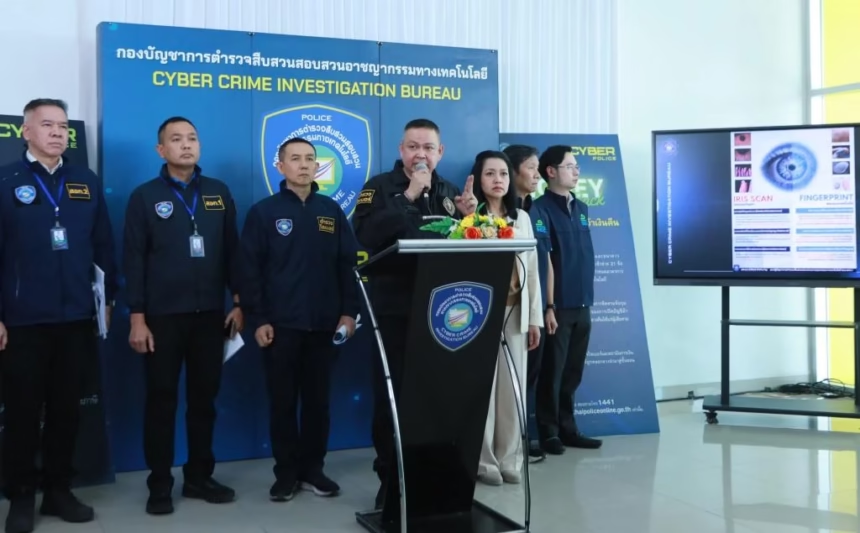BANGKOK — Thai regulators have raided an iris-scanning centre tied to the controversial World Network, previously known as Worldcoin, in central Bangkok. SEC officials and officers from the police Cyber Crime Investigation Bureau (CCIB) carried out the operation on Friday to protect the public from potential scams and money laundering
The early morning action by the Securities and Exchange Commission (SEC) and the Cyber Crime Investigation Bureau (CCIB) led to several arrests and a haul of devices, highlighting a strict stance on unlicensed crypto activity amid rising concerns over scams, laundering, and misuse of biometric data.
A joint team of more than 20 SEC investigators and CCIB cyber officers moved on a low-key shopfront in Pathum Wan at around 6 a.m. Armed with court-backed warrants under the Emergency Decree on Digital Asset Businesses B.E. 2561 (2018), officers searched the premises and seized computers, Orb scanners, transaction ledgers, and phones believed to support unauthorized WLD token trading.
Witnesses reported a tight security cordon as plainclothes officers managed the scene, while undercover agents had visited hours earlier to gather final intelligence.

SEC’s Surveillance on WorldCoin
Pol Lt Col Narongdet Petchkaew of the CCIB said the operation followed weeks of cyber monitoring. He cited irregular wallet transfers, weak or unverified KYC checks, and heavy social media marketing aimed at young Thais.
The SEC supplied financial intelligence, he said, and the team moved quickly to secure evidence. A site manager and two technicians were detained without incident and taken to CCIB headquarters in Chatuchak for questioning.
The focus of the action is World Network’s model, where users queue at silver, eye-shaped Orb stations that scan irises to confirm they are human, then issue a digital ID and WLD tokens. Thailand hosts 102 such stations, one of the largest footprints in Asia.
Regulators argue the activity goes beyond ID checks and amounts to an unlicensed exchange service. Under Section 3 of the decree, any facilitation of digital asset trading is a regulated business that requires SEC approval.
Officers allege the raided venue offered instant WLD-to-baht conversions via third-party wallets, skipped anti-money laundering controls, and put users at risk of fraud.

Safety in Cryptocurrency
The move did not come out of the blue. The SEC’s Surveillance Division had listed World-linked operations on its Investor Alert portal for months, flagging them as high risk.
Intelligence reports suggested links to KuCoin, which has been named in a Whale Hunting investigation into funds washed through scam networks in Cambodia, a pattern similar to pig-butchering schemes that drained billions last year.
SEC Deputy Secretary-General Jomkwan Kongsakul told reporters the agency will not ignore such warnings. Unlicensed platforms, he said, undermine trust and open a path for organized crime. Joint operations with the CCIB aim to protect Thai users from get-rich pitches that end in stolen data and lost money.
Thailand is trying to balance growth with safety in crypto. Adoption is climbing among urban youth, and the government has signalled support for controlled innovation.
Last week, Finance Minister Pichai Chunhavajira announced an 18-month pilot to let tourists convert up to 550,000 baht worth of crypto at registered exchanges, a move designed to boost spending in Phuket, Chiang Mai, and other hotspots.

Cyber Police Seized Equipment
Strict rules still apply. Breaches of Section 26 can bring 2 to 5 years in prison and fines up to 500,000 baht, with an extra 10,000 baht per day for ongoing violations under Section 66. Prosecutors say the suspects face these charges and plan to seek freezes on any WLD traced to the network.
Investigations are expanding. CCIB forensic teams are checking seized hardware for signs of data exposure. Iris scans are turned into unique codes, which raises privacy concerns similar to those that paused World operations in Kenya and drew scrutiny in Hong Kong and Spain.
The SEC says it will review all 102 Orb sites in Thailand within weeks and shut down any that fall short of the law. If evidence points to larger laundering networks, Pol Lt Col Narongdet said the CCIB will coordinate with Interpol. The SEC is urging affected users to file claims via its Check First app, with compensation from seized assets possible after convictions.
World Network, backed by OpenAI’s Sam Altman, issued a short statement saying it operates only where it is compliant and does not support unlicensed exchanges. Consumer advocates remain skeptical. Pimchanok Jiranuwat of ThaiNetWatch called the model exploitative and urged a ban on Orbs to protect vulnerable groups.
Bangkok’s message to crypto operators is plain. Innovate with a licence and robust safeguards, or face swift action. With Brazil halting World in January and the EU weighing new biometric rules, scrutiny is only growing.














